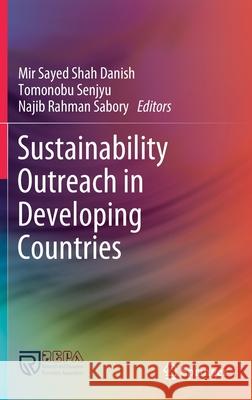Sustainability Outreach in Developing Countries » książka



Sustainability Outreach in Developing Countries
ISBN-13: 9789811571787 / Angielski / Twarda / 2020 / 206 str.
Sustainability Outreach in Developing Countries
ISBN-13: 9789811571787 / Angielski / Twarda / 2020 / 206 str.
(netto: 497,21 VAT: 5%)
Najniższa cena z 30 dni: 501,19
ok. 22 dni roboczych.
Darmowa dostawa!
Preface
Mir Sayed Shah Danish
Since 2004, Dr. Danish has been involved in multidisciplinary engineering and technology by leading several projects in those fields while continuing as an active scholar and educator. He is an assistant professor at the University of the Ryukyus, Japan; founder and chair of the IEEE-Sustainable Energy and Intelligent Engineering Society (SEIES-PES & FRID joint chapter, Fukuoka Chapter); founder and facilitator of the Rahkaar IET On-Campus Society; Founder of the Rahkaar Research and Education Organization; and founder and president of the Research and Education Promotion Association (REPA).
Tomonobu Senjyu
Professor Senjyu leads the Power Energy System Control Laboratory (PESC), which employs recent technology and produces novel research outcomes. His laboratory publishes several peer-reviewed journals each year. He has made salient contributions to many international journals and has more than 500 peer-reviewed publications in high-ranking academic databases to his credit. His research interests are in renewable energy, power system optimization and operation, power electronics, and advanced control of electrical devices.
Najib Rahman Sabory
Associate Professor Najib Rahman Sabory graduated from Electrical and Electronics department of engineering school at Kabul University in 2001. Since then he has been teaching in this department. From 2009-2011, he served as the deputy dean for the Engineering school at Kabul University. After a Fulbright scholarship was awarded to him in 2011, he completed a master’s degree in Sustainable Energy and a graduate certificate in Project Management from A. James Clark School of Engineering at University of Maryland College Park. He has also earned an MBA in 2014 from World Wide Science Academy in Malaysia. Mr. Sabory was awarded a UNITAR (United Nations Institute for Training and Research) fellowship in 2007 for a period of seven months. He learned many advanced concepts in project management, leadership and change management. He later remained in this program for 2008 and 2009 cycles as coach and resource person. Mr. Sabory has participated in a series of workshops and symposiums about leadership and entrepreneurship back in US. In 2011, Mr. Sabory led an Inter-ministerial Commission for Energy (ICE) committee for preparing capacity building strategy for energy sector of Afghanistan.
Currently Mr. Sabory serves as Associate professor and head of the Energy Department of engineering school at Kabul University. He is also the deputy chairman of Afghanistan Renewable Energy Union (AREU) since early 2017. Moreover, he is the rotating chairman of Afghanistan Awareness and Analysis (A3), a Kabul based Think-Tank.
This book presents a comprehensive collection of recent research on the timely topic of sustainable development goals, with a focus on developing countries. In this manner, it furnishes interdisciplinary coverage in terms of sustainable development; it sets forth the pillars of sustainability (environmental, technical and technological, social, institutional, and economic disciplines); and it explores the adaption of these pillars for long-term sustainability.
With its survey of transboundary research, experiences, and lessons learned, the book offers integrated conceptual and empirical contributions from diverse interrelated fields. Viable options are set forth for societies in transition in the twenty-first century to achieve well-being in the lives of their people through the eradication of poverty, mitigation of climate change, promotion of lifelong learning opportunities, and empowerment of society. These options also make it possible to deploy affordable energy, sustain economic growth, offer innovation, reduce inequality, and finally, to help ensure global sustainability.
1997-2026 DolnySlask.com Agencja Internetowa
KrainaKsiazek.PL - Księgarnia Internetowa









